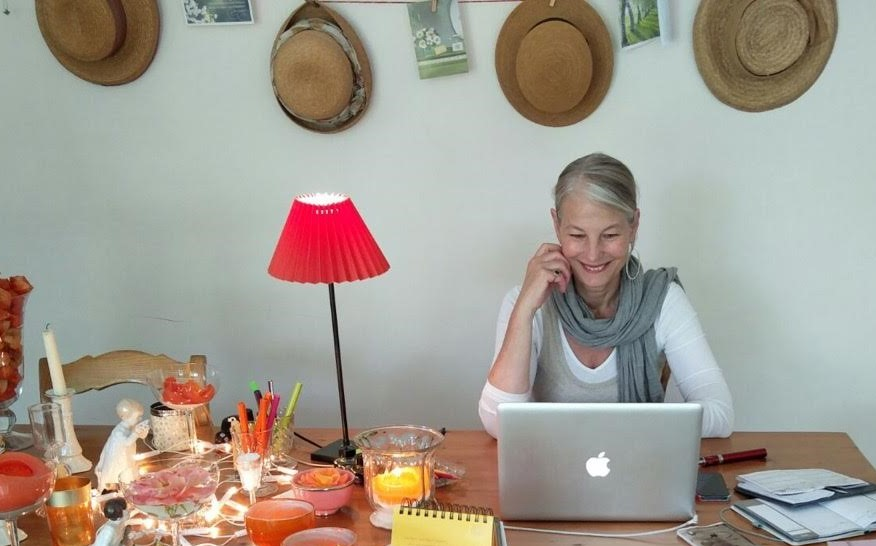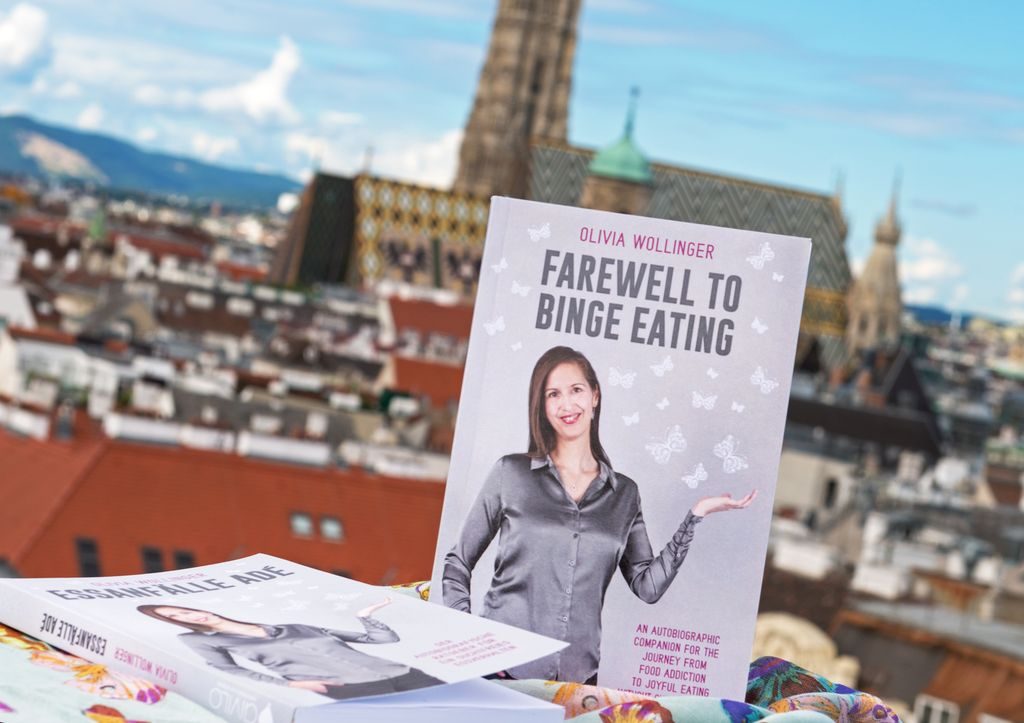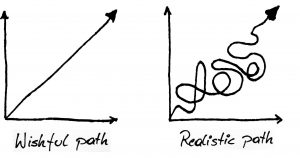I received another question about my book “Farewell to Binge Eating”:
Dear Ms. Wollinger:
I’ve just finished reading your book “Farewell to Binge Eating” and would like to thank you very much. Your book has been written with such loving, supportive care and without putting too much emphasis on the question of how much we eat and when we eat. My favorite sentence is: “I allow my body to choose its own weight”, because I’m still struggling a lot with this issue.
The topic is by no means new to me since I’ve been trying to find healing for my eating disorder for more than six years now. Hummers/beckoners, hunger/satiety, psychotherapy, also for six years, – the whole deal. I can also tell you that I was successful in the sense that I have not experienced any more binging episodes for the past several years, meaning that I no longer have been gorging myself with masses of food. Having said that, it would seem, however, that I’m still eating more than I need because I’ve still been overweight for the past 5 years, weighing 95 kilos with a height of 1.69 m. No use glossing over this. I reached this weight once I had stopped regulating my eating, and since then I’ve not budged from it, although I don’t feel that I’m overeating – maybe just once in a while, but only smaller amounts. Prior to my eating disorder therapy, I would have been ecstatic if I had been able to eat “normally” as I do now, and I imagined that I would also achieve a “normal” weight then. I did not imagine 95 kilos.
While you don’t mention any specific numbers in your book, I read that you did gain some weight, but did not become overweight. I, on the other hand, with a BMI of 33, am clearly overweight.
My question to you: Did you ever experience a case, for instance with one of your clients, that severely overweight people lost weight, even without regulating their eating? And do you have any ideas for me what I should pay closer attention to?
I’m not happy with this weight. And I will never, ever force myself again – I have long since abandoned all the harshness and violence. Still, I have been fat, ever since I stopped.
In order to help you understand my situation: In my younger years I was a classical dancer and very skinny (47 kilos) and, of course, subjected myself to harsh regimentation. After I stopped, I gained weight, and my binging episodes started. Still, my weight fluctuated between diets and binging phases from 50 – 70 kilos. After my first three pregnancies I managed to lose weight every time, up to 40 kilos per pregnancy. After my fourth pregnancy, this no longer worked so well. I didn’t want to diet and stopped. I experienced my fifth pregnancy without dieting, but gained weight. After giving birth, my weight dropped to 85 kilos, and I was happy, thinking I had been healed. I had learned how to deal with food urges, to listen to my feelings of hunger and satiety and to humming and beckoning foods. Much to my dismay, I started slowly gaining weight after about a year, until I reached my current weight which I’ve been holding for about three years now. No matter how carefully I pay attention to my hunger, satiety etc. I just doesn’t seem to work.
I am clearly fat. It cannot be that my body really wants to be this fat? What do you think?
Let me add that I’ve experienced two groups of women in my therapy groups: the “skinnies” who have managed to maintain their weight with a lot of regimentation, and the “fatties”. In all these years I found that many of the “skinnies” were able to roughly maintain their weight and stopped controlling and vomiting, meaning that they had left their disorder behind them.
However, I don’t know any “fatties” (me included) who reached their feel-well weight. Some of them lost weight in the beginning. Then it stopped for good. Some of them didn’t lose weight at all, or even gained some additional weight, although many of them, just like me, think that they are eating normally by now.
I would be most grateful for your response.
Kind regards,
G.

Dear Ms. G.,
Many thanks for your kind words about my book which are much appreciated. As an author, it is always delightful to learn that one’s words have actually gotten through to and been appreciated by a reader.
I gather from your note that you’ve already mastered the most difficult part of the path to recovery from eating disorder: Accepting yourself the way you are, treating yourself with kindness and no longer being overcome by food craving attacks.
If I’ve understood you correctly, you are asking how you might be able to lose excess weight without imposing the strict controls that are so typical for eating disorder.
Your question is extremely interesting and important. Therefore, I consulted extensively with my colleague Claudia Münstermann (www.claudia-münstermann.de). We put our heads and our combined knowledge together and ended up writing the following article about Intuitive Eating.
Claudia Münstermann practices in Aachen, Germany, and also offers Skype Coaching for individuals afflicted by eating disorder, both in English and in German. She is experienced in the care of overweight people. (www.claudia-müstermann.de) Below you’ll see a picture of Claudia during a Skype Coaching session 🙂

During the work on this article, I (Olivia) was thinking that it would make sense to add another chapter to the book “Farewell to Binge Eating” instead of “only” writing an article. By adding a chapter one could ensure that there already is a deeper understanding of the mechanisms of addition. We think this is important so that this article may be understood in the way we intended. Since we assume that this text will also be read by people who don’t yet know the book “Farewell to Binge Eating”, we are going to address the topic of addiction in some detail. However, we are not going to explain again some other concepts, such as “hummers” and “beckoners” and the question how one can distinguish between physical and emotional hunger.
From a distance, it is difficult to judge what the roots of your excess weight might be. (I’m assuming that you already had your thyroid and hormone functions checked?) We hope that you will find a few helpful thoughts in the following article and look forward to hearing from you again.
Best regards,
Olivia Wollinger & Claudia Münstermann
(translated by Ulli Wiesner)
![]()
![]()
![]()
![]()
![]()
![]()
![]()
First, the question:
Do overweight people suffer from eating disorder?
This question cannot be answered with a simple yes or no. First of all, we should consider what it means to be afflicted by eating disorder and to suffer from ravenous food cravings.
In our experience, the main criteria are as follows:
- There are moments of powerlessness when we stuff ourselves in a trance-like condition.
- Thoughts such as “I must lose weight”, “what am I allowed to eat?” and the like dominate major part of our thinking.
- Our state of mind and sense of self-worth are determined by the number on the scale every morning and the question whether today was a “good” or a “bad” food day.
- Many different types of feelings (boredom, stress, anxiety, loneliness etc.) are addressed by eating.
- We experience a deep sense of self-hatred, especially regarding our looks (figure).
- The perception of our own body is warped.
- Some of our eating behaviors are suppressed or denied (“I only eat the healthy stuff!”)
- We experience our eating behavior as a major burden.
Below follows a quote from “Farewell to Binge Eating”:
It is difficult to admit to oneself “Yes, I have an addictive eating disorder”. I know that from own experience. Who wants to admit being an addict? Maybe the word “addiction” evokes in you – like in me – the image of someone whose life has been irretrievably messed up, a lost soul leaning against the wall of a house, waiting for the next “fix”.
It was not quite as bad for me. On the contrary: I tried to perform my various roles perfectly in order to maintain the external impression that I was doing well. That can be pretty exhausting. But there were times when I actually did feel like a junkie, like when I would dress again in the evening in order to walk, zombie-like, to the nearest gas station where I could buy my “drugs” – sweets. My urge to do this was so strong that it actually put me into some kind of trance. “I need sweets, now, right away!” Nothing else mattered.
Although we never can get out of our own skin, it is amazingly possible to deceive oneself. For years on end I avoided facing the truth. I minimized my addiction by calling it “my little eating problem”. Each downfall was followed by a high, and I forgot completely what had happened before. I had convinced myself that I would tackle my problem with a new diet. Guaranteed! There is a game children play – maybe you know it, too: If I hold my hands up in front of my eyes and don’t see anything, nobody will find me. If I don’t “see” my food addiction, does that mean it does not exist?
I was living by myself at the time and could stock my fridge exclusively with “permitted” foods, such as cottage cheese, carrots, at least five different fat free yoghurts and Diet Cola. One of my girlfriends made the following comment: “If you only eat this stuff, you should be as thin as a rail”. For a moment, her remark brought me back to reality. I was deeply ashamed and quickly tried to change the subject. Whenever I was eating “forbidden” things, I would do so quickly, and often while I was doing something else. Eating – me? Never! During my binging episodes, the trancelike condition I found myself in helped me to repress things. Only after the episode had passed would I become painfully aware of my predicament. Still, I would begin another diet the following morning, being firmly convinced that I was going to follow a healthy one from now on. Surely, I of all people did not have a problem with food!
The term “eating disorder” doesn’t sound much better than “compulsive eating”. After all, who wants to have a “disorder”? Ultimately, it doesn’t matter what you call your behavior. What’s much more important is to determine whether your eating behavior and the thoughts that go along with it, are burdensome to you.
I was able to start my path of recovery from eating addiction by being honest with myself and admitting the following:
- Yes, I do have a problem, and it is enormous.
- I eat more than is good for me.
- I experience regular binging episodes.
- I am unable to stick to my diet plans.
- I lead a double life: I count every single calorie, eat healthily AND gorge myself with masses of sugary and fatty stuff during my binge eating episodes.
- The stricter the self-imposed discipline, the more severe the binging episodes.
- I am unable to reach my ideal weight.
- If I occasionally do reach my target weight by trying extremely hard, I am unable to maintain it over the long run and I keep putting on weight again.
- I’m feeling miserable, no matter how often I pretend to be happy.
- New Year’s resolutions, like “I’m going to change this once and for all at 00:00:01 h on January 1st” are meaningless.
- It doesn’t make any sense whatsoever to wait for the big key event that finally will throw a switch in my brain. I must start working on myself and do it now.
Sometime later I recognized:
- I need help, because I won’t be able to do this on my own.
The dubious utility of diets
When people who are suffering from eating disorder start a diet program, it seldom works for them in the long term.
Our normal lives have tend to surprise us time and time again with stressful situations, like a family member’s surgery, a new work project and so on. Since such situations require a lot of energy and discipline, there is none left to stick to a diet. “How am I supposed to focus on a diet when I’m going through such a stressful time?” We stop dieting and gain weight again, faster and more than we want. As soon as the stress has abated, the old game starts anew, sometimes for years. This is the (in)-famous “yo-yo effect”.
Meanwhile, I (Claudia) know dozens of articles that maintain that diets don’t work, no matter whether we are afflicted by eating disorder or not. Just like Olivia writes in her book “Farewell to Binge Eating”: We cannot stick our entire lives to a regimen of strict self-castigation. When we control ourselves severely, put a number of foods on our forbidden lists and go without many things, inner rebellion oftentimes is the outcome. Animal tests have shown that when you starve mammals, they will react with feeding frenzies. When unanticipated stress situations occur – something that can happen often in our lives – all prohibitions are cast aside, and we catch up to all the things we so painfully deprived ourselves of. Since our metabolism, however, already may have switched to starvation mode, and the entire caloric need has been adjusted downwards, weight gain is almost unavoidable.
According to statistics that are not sponsored by the diet industry, only 1 % of dieters lose weight over the long run. The overwhelming majority are back to their old weight after five to six years, if they’re lucky. Most of them are even heavier afterwards. If they continue to diet, they may drive their weight up even more and possibly start to be confronted with binging attacks against their will.
You will find a very good lecture by an American neuroscientist at the following address:
Why is it that diet programs are only rarely consistently adhered to? We believe the reason to be that they do not address WHY we eat, but only focus on WHAT we eat, although the question of “why” – the motivation for eating – is of overriding importance.
Is it possible to be overweight without eating disorder? We believe it is because the borders of eating disorder sometimes fluctuate: All of us eat for emotional reasons. Equally, hardly anyone eats every bite of food while paying close attention.
Here’s the important question: How often does it happen and for what reason?
In order to achieve sustainable weight loss, we must first do our homework. We need to lessen our emotional hunger and learn how to satisfy it by means other than food. What’s therefore important is to eat mostly to satisfy our physical hunger. The necessary behavior patterns need to become internalized so that we don’t throw them overboard in stressful situations. Only after we’ve mastered this, dietary recommendations can be adopted, at least in our experience.
This is what I (Olivia) experienced:
After I had freed myself of my addictive behaviors, my weight began to stabilize. This felt like such a relief: during my time with eating disorder, I often felt that I was gaining weight by just looking at a cake. Moreover, I was afraid that my weight would continue to go up and that I would completely lose control. To me, it was like a holiday to see that I was allowed to have cake and that my weight still remained the same. Since my self-love also increased during my path to recovery from eating disorder, I was able to accept my body despite its slightly higher weight. Finally! My self-destructive hatred had left me. Life became simpler, more beautiful, easier and more worthwhile.
Still, I had a problem: the pants in my favorite store no longer fit me. I am tall at 1.83 cm, and it was difficult to find pants that fit me both length- and breadth-wise. Because I finally was able to love myself, I decided to drop down just one dress size, no more. There’s the big difference to addiction: This wasn’t an unrealistic desire.
I wanted to lose weight – while loving myself. How does that work?After all these years of self-denial, prohibitions no longer worked. As soon as I tried, I immediately had a defiant reaction. (Cake! Cake! More cake!) Obviously, I wasn’t ready yet to have something taken away from me. Instead, I began adding things.
I consulted an expert on 5-elements nutrition who gave me some recommendations on the basis of my particular constitution. Here’s again the difference to addiction: I accepted it for what it was – a recommendation, without trying to adhere strictly to all points and changing everything right away. I began to experiment and to research.
The first step was porridge. Since my morning hummers are usually “sweet” and “soft” I mostly consumed baked sweets. How about trying porridge with fruits on the weekend? Naturally, my little child that’s throwing a tantrum on the floor (whom I introduced in my book) appeared immediately. I accepted it lovingly and reassured it that it did not have to forego the sweet baked stuff, but that it might be a good idea to try something new. Over time, I really started to like the porridge, and I no longer craved the baked goodies.I also used to eat lots of ready-made products, such as sauces, soups and frozen dishes. My advisor suggested replacing them. This did not mean giving up things, but rather introducing new daily habits, slowly, and step by step. I got to know and love new kinds of vegetables, such as pumpkin. Yummy, delicious and even sweet! Baked potatoes, too, could be fixed in a jiffy, and they actually tasted way better than the French fries from the fast-food place. Over time, I became so used to freshly prepared foods that I no longer wanted to eat the ready-made stuff.
Then, another round of self-honesty was needed. Did I really only eat when I was physically hungry? Or maybe just because it was cozy or because I wanted to “sweeten” my work? Did I really have to eat several pieces of chocolate after every meal, because “sweet” was still humming, or would one small piece suffice? Were the quantities I ate still appropriate?
I did again establish a nutritional regimen which, however, was completely different from my approach during eating disorder. Control and calories no longer were the main focus. Instead, I tried to examine my eating habits. I asked myself the following questions:How often did I eat?
Was I distracted when eating?
Where did I eat?
Did I pay attention to my satiety?
What did I drink?This approach was instructive because it showed me that I did not eat as mindfully as I had thought. Physical exercise, too, again became important. Thanks to my fitness center excesses during my time with eating disorder, I completely refused exercising for some time. I now needed to find types of exercise that I really enjoyed and was able to integrate into my daily routines.
All these measures enabled me to drop down one dress size, which took me a few months to accomplish. In contrast to the time with eating disorder, this was not a short-term diet with the promise of quick results. Quite the opposite: I very slowly introduced a new lifestyle. Therefore, my behavior remained consistent even during stressful moments, since it had become the new normalcy. Thus, I was able to maintain my new weight over the long term.The sentence my reader quotes in her mail is also my favorite: “I decided to learn to give my body what it needs and to accept the weight it chooses.” The reader’s mail, however, only cites the second part of the sentence, while I find the first part at least as important:
What does the body really need?
At some point, I had nourished my emotional hunger sufficiently to be ready to take another step: I wanted to reduce my sugar intake, since I often felt totally wiped out in the afternoon. With the help of my 5-elements nutritional advisor I knew that there might be a connection. I simply wanted to feel more vibrant.
I totally cut out sugar for a couple of weeks. This was only possible because I had allowed myself unlimited amounts of sweets during my path of recovery from eating disorder and therefore did not feel it as a great loss to have to go without sugar for a few weeks. Moreover, I learned on my path of recovery to satisfy my emotional hunger with things other than sweets. Still, my inner child and I had a few conversations during that time, and I explained repeatedly and lovingly, why I was doing this. After this phase, sugar re-entered my life, but in much smaller quantities than before. Mass-produced items with additives no longer tasted good to me. Instead, I developed a predilection for delicious home-made cakes. When choosing chocolates, I placed far greater emphasis on quality, which meant much less quantity.I started out by replacing white sugar with maple syrup, honey, brown sugar, and the like, because I felt they were better for me. My taste buds, too, seemed to agree. My special “goodie drawer” which I used to keep at home, also disappeared, meaning that I no longer had easy access to sweets. (Since I had left my eating disorder behind, I no longer took night-time trips to gas stations or convenience stores). Whenever “sweet” was humming, I asked myself very carefully whether this actually was a hummer or just a beckoner, and how much of it I actually needed.
Altogether, I lost a two-digit kilo amount and achieved the weight I have today.Is this regimentation?
Yes, it is.
Do I experience it as self-denial and want?
No, I don’t.
To me, that’s the significant difference to addiction.
As you can tell, the process of losing weight did not happen overnight, and was not achieved with the help of some miracle diet. Losing weight, while loving oneself, requires lots of patience. This path has to be taken step by step, without the expectation of quick results.
Living free of addiction means: I love myself just the way I am. I am valuable the way I am. I examine my motivation. I decide for myself. I am allowed to choose what’s important to me at a given moment. Well-being counts, and not regimentation.
Addictive thoughts would be: I hate myself. I MUST change, RIGHT AWAY, otherwise I’ll never be happy. I MUST be stricter with myself. I MUST finally muster more discipline. I MUST prove to myself that I’m not the world’s greatest loser. Under no circumstances must I eat food X, otherwise I will have failed. Strict self-control is front and center, and not well-being.
We’ve summarized a few points and questions in order to reflect on that we believe to be important for losing weight when struggling with excess weight:
In order to achieve lasting success, we need to do our “homework”. That means becoming able not to respond to emotional hunger by eating. When asking yourself, how successful you already are, answering the following questions might be helpful:
- How often do I let myself be seduced by “beckoners”?
- Do I mostly eat in peace and quiet or do I rush?
- How often do I compensate feelings with food (e.g. boredom or stress)?
- In most instances, do I stop eating once I’ve reached satiety or do I often “clean my plate” like a “good person”?
- How aware am I of my food consumption throughout the day?
- Am I able to derive enjoyment from quality, or do I equate enjoyment with quantity?
- Am I able to perceive what my body needs, or do I exclusively orient myself according to external units of measurement, such as what the scale tells me or calories?
Sometimes, overweight is caused by a number of emotional factors. I (Claudia) suggest to my clients to ask themselves some of the following questions:
- Are there cases of overweight / obesity in my family? Is this some kind of tradition? Do I only truly belong to my family if I’m heavy?
- Is my overweight some kind of protective layer? A shield against sexual assault? Every 7th woman has had to endure one or more instances of sexual assault. That’s powerful and may have an impact on eating behavior by producing the subconscious idea that weight guarantees safety.
- Does my physical “expansion” allow me to claim the space I otherwise don’t claim?
- Does food offer me the abundance, sweetness and the intense flavor I’m otherwise missing in my life?
- We believe that some issues require professional support, for instance the following questions:
- Am I prepared to have a closer look at my life, the way I shape it, and to look carefully at the stressors that make me eat?
- Am I prepared to regularly take a good look at myself and to become more mindful in all areas of life?
- Do I have the inner permission to be slender?
- Am I ready to leave my comfort zone and change things? In my partnership, with my children, my parents, my work, my daily routing, my time management, my pace, and the breaks I afford myself (in order to be less emotionally driven when eating)?
- Do I absolutely have to solve all my problems myself? Am I ready to accept that I may need competent help, which also may cost money?
- Would I like to grow, – meaning not girth-wise 😉 but rather in the sense of become more of an adult and to develop more mature strategies for resolving stress and conflicts?
I (Claudia) remember from my practice the case of a highly successful professional woman whose eating behavior only changed after deciding, against her usual habits, not to work during a long weekend. She did not open her laptop even once. Initially, that felt pretty uncomfortable, strange and somewhat anxiety-provoking to her. Despite her inner reservations, however, she began to enjoy more and more well-deserved peace and quiet instead of eating uncontrollably. This means that this particular woman did her “homework” by changing the stress factors in her life and therefore was able to change her eating habits and her weight.
When we attempt to lose weight, our nutritional habits must be re-examined.
- We believe that the artificial ingredients (for instance flavor enhancers, aromas, sweeteners, food colors or preservatives) that can be found in many foodstuff and drinks should be avoided as much as possible. We don’t like so-called “light “products and diet foods. Whenever possible, ready-made dishes should be replaced with freshly cooked ones. This does not mean depriving ourselves of enjoyment, but rather a change in our daily habits. (Here again the question: Am I ready to do this?)
- We are of the view that certain foodstuffs should be categorized as luxury foods, meaning they should not be consumed as staples but for the mere enjoyment of their taste. Sausages, noodles, sugar, fruit juices and soft drinks are among them.
- We think it is really important to address the issue of hidden sugar contained in e.g. potato chips, ketchup, sushi rice and many other ready meals. This requires taking the necessary time to read food labels. We also think it’s important to be mindful of the intake of meat, cheese and other fatty items (such as fried or breaded foods), meaning that it is particularly important to be aware of hunger and satiety, in addition to hummers and beckoners.
- Alcohol consumption also has a major impat on weight.
- We put a lot of emphasis on high-quality cooking oils and egional products.
- In our experience, addressing the body’s acid / alkaline balance is beneficial for our overall health and well-being.
- We also think it’s important to cook and bake. Only then will we be able to truly judge the quality of foods.
It is, however, very important to be free of the addiction. Otherwise one will read the list and think: “Ah, that means I’m not allowed to have any sugar?”, and that would only be one more diet. However, this is not supposed to be yet another list of “I am allowed to have this” and “this is forbidden”. What’s important is to achieve a balance in life, to make deliberate choices and to find a suitable lifestyle that works in the long run.
I (Claudia) think that the metaphor of the explorer Olivia uses in her book is really wonderful in order to describe how it can work when the urge to eat for emotional reasons truly has been resolved. We’re allowed an entirely new eating experience and can look at many different concepts of healthy eating, try them out and test them for enjoyment, fun and the ability to be integrated into our daily routines. Healthy eating no longer is an annoying duty, but rather an important part of dealing kindly with ourselves. It is something that may take time and bring us enjoyment.
One of my (Claudia’s) clients started initially with short fasting periods in order to lose weight (16:8, a variation of intermittent fasting. There is an 8-hour window for eating, following by 16 hours of fasting) after she had recovered from eating disorder and learned to eat mindfully, in addition to integrating enjoyable exercise into her life. Although she no longer suffered from binging episodes, she did not lose weight. At this point she started again, after some years, to pay attention to her caloric intake and then to try out, step by step, another nutritional pattern. Thereby, she was able to reduce her weight slowly. At this juncture, watching her calories no longer was part of a strict self-control, but rather an appropriate helping guide.
Here’s another one of my (Olivia’s) examples: When I was suffering from eating disorder, I used to control my exercise units with the help of a heart rate monitor. I absolutely HAD to jog for so and so many miles and burn so and so many calories. Whenever I wasn’t able to do this, I would recriminate myself and thought I was the greatest loser on earth. To me, it was important to get rid of my heart rate monitor on my path of recovery in order to allow myself to truly sense whether I actually needed this and to figure out what does me good. It was essential to sense what was good for me and to stop controlling myself all the time. I’ve now been free of addiction for many years. A couple of days ago, someone gave me a pedometer (step counter), and I really wanted to try and see how much 10,000 steps actually amount to. I thought wow, this is fun to see if I already did physically move enough during a regular day. This is a positive incentive for me, and I enjoy it. Therefore, I’ve been carrying the pedometer with me for the past couple of days. But here’s the difference to addiction: I feel it is a positive incentive, and I think it is fun. Whenever I don’t manage to do the 10,000 steps, it’s not a big deal, no drama and no failure. It simply doesn’t matter. I could do without this gadget, but for the time being I think it’s neat, and therefore I’ll keep it for a while.
Again: While a similar measure may be a burden during times of addiction, it may otherwise have a completely different effect. It is often important to abandon control mechanisms in order to potentially use them later on as helpers.
If there actually was addiction, it is important on the path of recovery to be mindful regarding the question: Is the “tweaking” of my nutrition actually good for me or will it again drive me into addictive behaviors? Do the changes work for me or do I again expect too much, all at once? Even though our intentions may be truly wholesome, they should not again lead us to a life that’s governed by control.
We need to question our motivation: Losing weight without yo-yo effect needs patience, especially when we’re over 30. Many diets promise the ultimate success with little effort. We believe, however, that this cannot work in the long run without effort and without the deliberate decision to introduce changes into our lives.
- How important is it to me to lose weight and what am I prepared to do in order to achieve this goal?
- Am I hoping for a miracle diet that will bring the solution by magic?
- Do I believe that a skinnier “me” will be a better and happier human being?
- For whom do I want to lose weight? Am I responding to external demands?
- Am I prepared to accept changes to my lifestyle?
- Am I prepared to have a closer look at the underlying causes, e.g. the question “what do I really need my excess weight for?”
- Am I prepared to invest time?
- Am I prepared to examine my own behavior honestly and to make the necessary changes?
- Am I ready to change long-standing habits?
- Do I realize that this is a life-long process and not a slap-dash quick turnaround exercise?
- Do I understand that food and eating are always linked to other areas of life?
If we really want to lose weight, we won’t be able to do so without changing our life style. The question is: “Do I really want that?”
If our answer is: “I really don’t want to put myself through this, it’s simply too much trouble. I’m feeling reasonably healthy and like myself the way I am”, we are, alas, often met with a lack of understanding in our society. Here, a lot of self-confidence and a certain indifference vis-à-vis others’ comments are needed.
I (Claudia) read a few studies on this topic that clearly indicate that good health and longevity do not depend on body weight, but rather on the following 4 factors:
- Regular exercise
- plenty of fresh fruit and vegetables
- moderation with alcohol and nicotine
- effective stress coping mechanisms
Maybe it is necessary to re-define the idea of “beauty” and “health” in our heads? Maybe we’re finally allowed to accept ourselves the way we are, simply because we feel well? Maybe we’ll reach the point where we stop following external demands and instead are able to feel what we really want?
What do YOU really want? It is your life, and you are allowed to make your own conscious decisions.
![]()
![]()
![]()
![]()
![]()
![]()
Ms. G. responded as follows:
Dear Ms. Wollinger,
Wow – thanks a million for taking the time and trouble for your comprehensive response!
I read it while here on vacation, and immediately got in my car in order to have a good cry, the reason being that it was both shocking and beneficial to learn that there needs to be regimentation. Although I did get the message that this is loving regimentation, aimed at supporting my wellbeing. And this resonates and touches me.
After reading your book, I had already embarked on the path of trying to find out what my body really needs and whether I’m actually providing it.
To my surprise, I found out that there are two specific points that are different from what I thought. I quite often eat not what I need, not because I decide on a beckoner, but because with five children in my life it is an additional effort to prepare food separately for me. I can see that it’s important to do more for myself by taking my own nutritional needs more seriously.
For instance, I would rather have vegetables, preferably cooked or steamed, but the kids want potatoes, rice and meat etc. This means that I not only prepare what they like but also end up eating it.
Secondly, I found that I’m overeating somewhat every evening, not to the point where my tummy starts aching, but I ignore the quiet voice of the first satiety signal and tell myself: “Under no circumstances will I stop now.”
When reading the questions, my strongest hummers came were related to sweetness, abundance and intensity. It also fits the fact that I’m having lots of trouble filling in my butterfly. I’m only aware of two or three things that do me good and a couple of things I like and enjoy.
I can see that the path ahead will be a long one, but I’m very motivated to continue. I will start to tackle the points I’ve just discovered and I’m excited to see where that will lead me.
Many thanks to both of you and warmest regards,
G.

You will find more information about our work at the following internet address:
www.claudia-münstermann.de and here at www.farewelltobingeeating.com.
Both books “Farewell to Binge Eating” and “Essanfälle adé” (German Edition) are available via Amazon.



